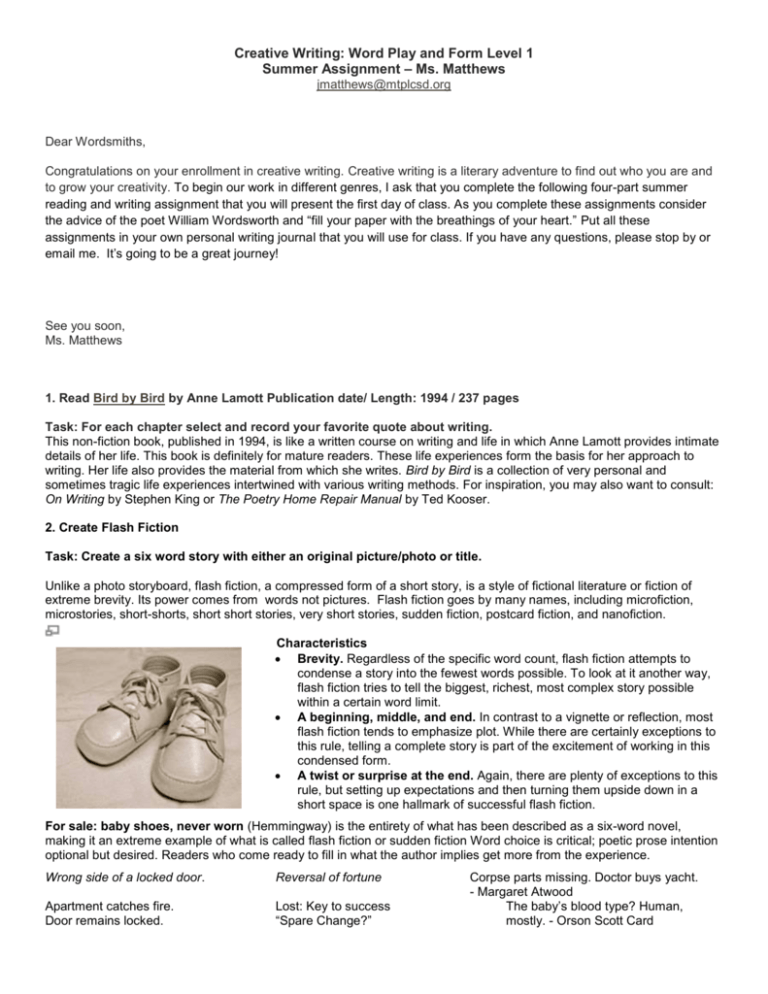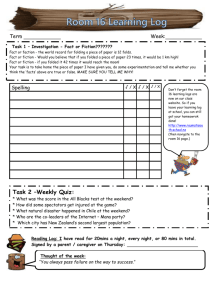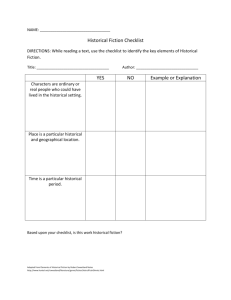Creative Writing: Word Play and Form Level 1 Summer Assignment
advertisement

Creative Writing: Word Play and Form Level 1 Summer Assignment – Ms. Matthews jmatthews@mtplcsd.org Dear Wordsmiths, Congratulations on your enrollment in creative writing. Creative writing is a literary adventure to find out who you are and to grow your creativity. To begin our work in different genres, I ask that you complete the following four-part summer reading and writing assignment that you will present the first day of class. As you complete these assignments consider the advice of the poet William Wordsworth and “fill your paper with the breathings of your heart.” Put all these assignments in your own personal writing journal that you will use for class. If you have any questions, please stop by or email me. It’s going to be a great journey! See you soon, Ms. Matthews 1. Read Bird by Bird by Anne Lamott Publication date/ Length: 1994 / 237 pages Task: For each chapter select and record your favorite quote about writing. This non-fiction book, published in 1994, is like a written course on writing and life in which Anne Lamott provides intimate details of her life. This book is definitely for mature readers. These life experiences form the basis for her approach to writing. Her life also provides the material from which she writes. Bird by Bird is a collection of very personal and sometimes tragic life experiences intertwined with various writing methods. For inspiration, you may also want to consult: On Writing by Stephen King or The Poetry Home Repair Manual by Ted Kooser. 2. Create Flash Fiction Task: Create a six word story with either an original picture/photo or title. Unlike a photo storyboard, flash fiction, a compressed form of a short story, is a style of fictional literature or fiction of extreme brevity. Its power comes from words not pictures. Flash fiction goes by many names, including microfiction, microstories, short-shorts, short short stories, very short stories, sudden fiction, postcard fiction, and nanofiction. Characteristics Brevity. Regardless of the specific word count, flash fiction attempts to condense a story into the fewest words possible. To look at it another way, flash fiction tries to tell the biggest, richest, most complex story possible within a certain word limit. A beginning, middle, and end. In contrast to a vignette or reflection, most flash fiction tends to emphasize plot. While there are certainly exceptions to this rule, telling a complete story is part of the excitement of working in this condensed form. A twist or surprise at the end. Again, there are plenty of exceptions to this rule, but setting up expectations and then turning them upside down in a short space is one hallmark of successful flash fiction. For sale: baby shoes, never worn (Hemmingway) is the entirety of what has been described as a six-word novel, making it an extreme example of what is called flash fiction or sudden fiction Word choice is critical; poetic prose intention optional but desired. Readers who come ready to fill in what the author implies get more from the experience. Wrong side of a locked door. Reversal of fortune Apartment catches fire. Door remains locked. Lost: Key to success “Spare Change?” Corpse parts missing. Doctor buys yacht. - Margaret Atwood The baby’s blood type? Human, mostly. - Orson Scott Card 3. Maintain a Commonplace Journal Task: You will need a writing journal of your choice. A Commonplace Journal isn’t really a journal, and it isn’t quite a scrapbook. It is collection of excerpts from other people’s books, quotes, conversations, lyrics, or any remarkable things you see, even graffiti counts. These notations could be just fragments and you should have at least 20. 4. Find Your Voice through Poetry Task: Read a book of poetry – your choice. Select and copy in your Commonplace Journal three favorite poems from your book or from any of these websites below. Write a short explanation as to why these poems speak to you. What is it about these poems that you enjoy or admire? I have provided a short list of incredible websites for you to explore and bookmark and some writers you might find interesting. Poetry 180 http://www.loc.gov/poetry/180/p180-list.html American Life in Poetry http://www.americanlifeinpoetry.org/ The Favorite Poem Project http://www.favoritepoem.org/videos.html The American Academy of Poets https://www.poets.org/ Some writers you might want to explore: Aiken, Conrad* Alexander, Elizabeth (read Obama’s inaugural poem) Auden, WH Bishop, Elisabeth* Brooks, Gwendolyn* Cisneros, Sandra Cummings, EE Doty, Mark Dove, Rita* Dunn, Stephen Frost, Robert* Ginsberg, Allen Gluck, Louise* Hall, Donald* Hass, Robert* HD (Doolittle, Hilda) Housman, A.E. Hughes, Ted Jarrell, Randall* Jeffers, Robinson Karr, Mary Kinnell, Galway Kooser, Ted* Kumin, Maxine* Kunitz, Stanley* Levine, Philip** Masters, Edgar Lee Merwin, W.S.* Millay, Edna St. Vincent Neruda, Pablo (published bilingually) Olds, Sharon Owen, Wilfred Pinsky, Robert* Plath, Sylvia Roethke, Theodore Rukeyser, Muriel Ryan, Kay* Sandburg, Carl Sexton, Anne Shapiro, Karl* Simic, Charles* Spender, Stephen* Stafford, William* Stevens, Wallace Swenson, May Szymborska, Wislawa (translated) Van Duyn, Mona* Walcott, Derek Whitman, Walt Wilbur, Richard* Williams, William Carlos* Wright, James *Former US Poet Laureate **Current US Poet Laureate These are just suggestions. Find one YOU like and inspires you!. For more information: http://www.loc.gov/poetr y/laureate.html#list http://www.poets.org/ind ex.cfm





